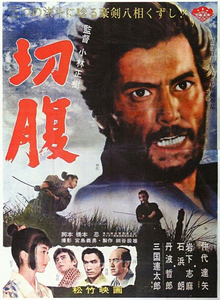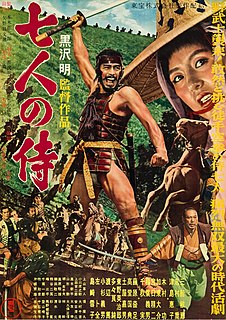 W
WThe Bad Sleep Well is a 1960 Japanese crime mystery film directed by Akira Kurosawa. It was the first film to be produced under Kurosawa's own independent production company. It was entered into the 11th Berlin International Film Festival.
 W
WCastle of Sand is a 1974 Japanese police procedural directed by Yoshitarō Nomura, based on the novel Suna no Utsuwa by Seicho Matsumoto.
 W
WDodes'ka-den is a 1970 Japanese film directed by Akira Kurosawa, based on a book by Shūgorō Yamamoto. It was Kurosawa's first film in color.
 W
WHarakiri is a 1962 Japanese jidaigeki drama film directed by Masaki Kobayashi. The story takes place between 1619 and 1630 during the Edo period and the rule of the Tokugawa shogunate. It tells the story of the rōnin Hanshirō Tsugumo, who requests to commit seppuku (harakiri) within the manor of a local feudal lord, using the opportunity to explain the events that drove him to ask for death before an audience of samurai. The film continues to receive critical acclaim, often considered one of the best samurai pictures ever made.
 W
WThe Hidden Fortress is a 1958 jidaigeki adventure film directed by Akira Kurosawa. It tells the story of two peasants who agree to escort a man and a woman across enemy lines in return for gold without knowing that he is a general and the woman is a princess. The film stars Toshiro Mifune as General Makabe Rokurōta and Misa Uehara as Princess Yuki while the role of the peasants, Tahei and Matashichi, are portrayed by Minoru Chiaki and Kamatari Fujiwara respectively.
 W
WI Live In Fear is a 1955 Japanese drama film directed by Akira Kurosawa, produced by Sōjirō Motoki, and written by Kurosawa with Shinobu Hashimoto, Fumio Hayasaka, and Hideo Oguni. The film stars Toshiro Mifune as an elderly factory owner so terrified of the prospect of a nuclear attack that he becomes determined to move his entire extended family to what he imagines is the safety of a farm in Brazil.
 W
WIkiru is a 1952 Japanese drama film directed and co-written by Akira Kurosawa and starring Takashi Shimura. The film examines the struggles of a terminally ill Tokyo bureaucrat and his final quest for meaning. The screenplay was partly inspired by Leo Tolstoy's 1886 novella The Death of Ivan Ilyich.
 W
WJapan's Longest Day (日本のいちばん長い日), also known as The Emperor and the General, is a 1967 Japanese war film directed by Kihachi Okamoto. The subject of the majority of the movie is the period between noon on August 14, 1945, when Emperor Hirohito made the decision to surrender to the Allies in World War II and noon on August 15, 1945, when the emperor's recorded message announcing the surrender was broadcast to the Japanese people. Film historian Joseph L. Anderson describes the film as "a meticulous reconstruction of the day Japan surrendered and thus ended the Pacific War.
 W
WMahiru no ankoku is a 1956 Japanese film directed by Tadashi Imai.
 W
WRashomon is a 1950 Jidaigeki psychological thriller/crime film directed by Akira Kurosawa, working in close collaboration with cinematographer Kazuo Miyagawa. Starring Toshiro Mifune, Machiko Kyō, Masayuki Mori, and Takashi Shimura as various people who describe how a samurai was murdered in a forest, the plot and characters are based upon Ryunosuke Akutagawa’s short story "In a Grove", with the title and framing story being based on "Rashōmon", another short story by Akutagawa. Every element is largely identical, from the murdered samurai speaking through a Shinto psychic to the bandit in the forest, the monk, the rape of the wife, and the dishonest retelling of the events in which everyone shows his or her ideal self by lying.
 W
WSamurai Assassin is a 1965 Japanese movie directed by Kihachi Okamoto and starring Toshiro Mifune, Koshiro Matsumoto, Yūnosuke Itō, and Michiyo Aratama. Samurai Assassin is set in 1860, immediately before the Meiji Restoration changed Japanese society forever by doing away with the castes in society and reducing the position of the samurai class.
 W
WSamurai Banners is a Japanese samurai drama film released in 1969. It was directed by Hiroshi Inagaki and is based on the novel Furin kazan by Yasushi Inoue.
 W
WSamurai Rebellion is a 1967 Japanese jidaigeki film directed by Masaki Kobayashi. The film is based on Hairyozuma shimatsu, a short story by Yasuhiko Takiguchi.
 W
WSeven Samurai is a 1954 Japanese epic samurai drama film co-written, edited, and directed by Akira Kurosawa. The story takes place in 1586 during the Sengoku period of Japanese history. It follows the story of a village of desperate farmers who hire seven rōnin to combat bandits who will return after the harvest to steal their crops.
 W
WShiroi Kyotō is a 1965 novel by Toyoko Yamasaki. It has been adapted into a film in 1966 and then five times as a television series in 1967, 1978, 1990, 2003, and 2019. The 1966 film was entered into the 5th Moscow International Film Festival where it won a Silver Prize.
 W
WThe Sword of Doom , is a 1966 jidaigeki film directed by Kihachi Okamoto and stars Tatsuya Nakadai. It is based on the serial novel of the same title by Kaizan Nakazato.
 W
WThrone of Blood is a 1957 Japanese historical drama film co-written and directed by Akira Kurosawa, with special effects by Eiji Tsuburaya. The film transposes the plot of William Shakespeare's play Macbeth from Medieval Scotland to feudal Japan, with stylistic elements drawn from Noh drama. The film stars Toshiro Mifune and Isuzu Yamada in the lead roles, modelled on the characters Macbeth and Lady Macbeth.